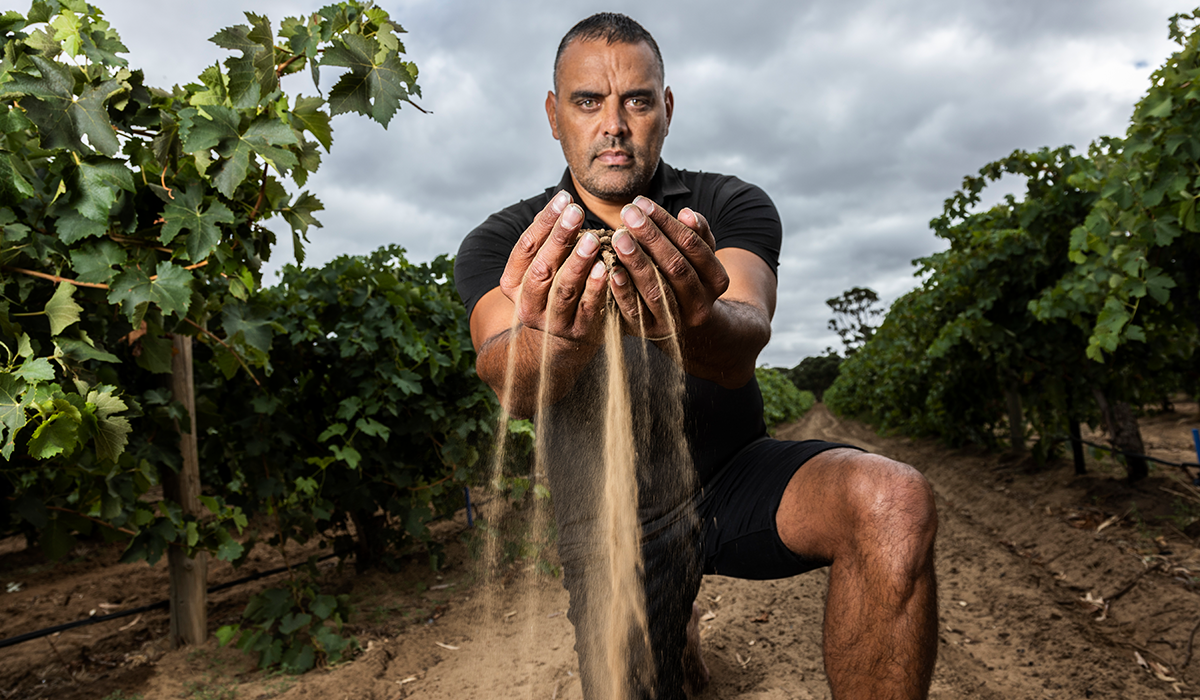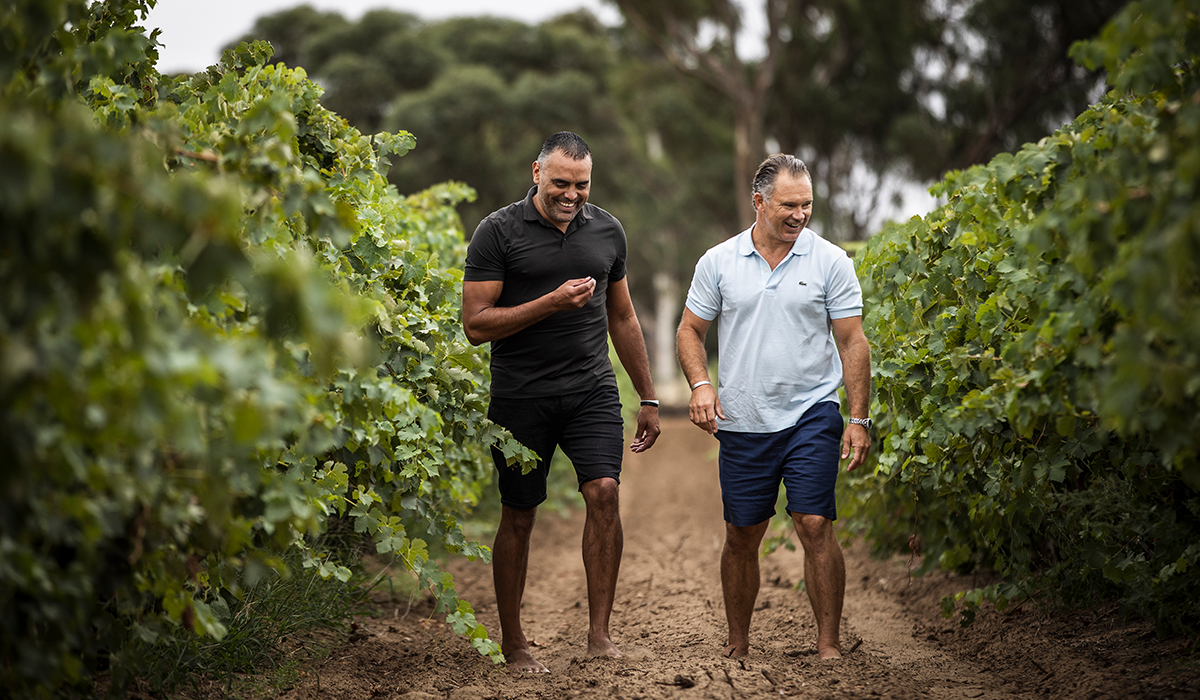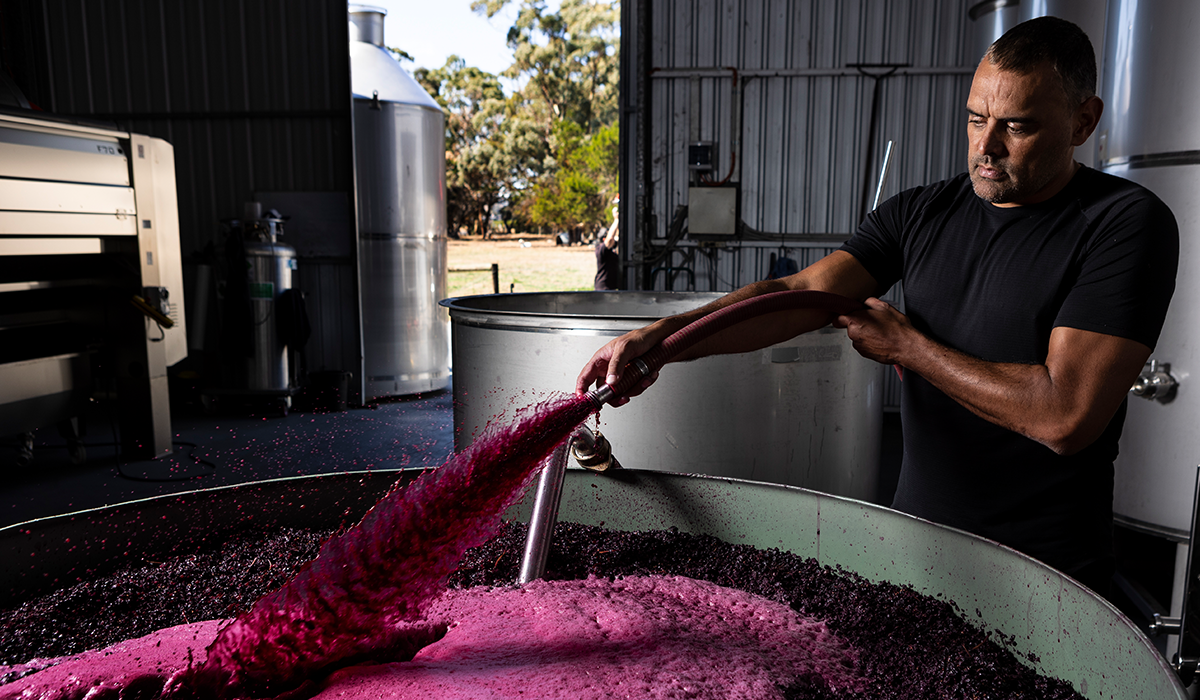By J’aime Cardillo
11 Apr, 2024
Munda Wines is the majority Indigenous-owned label focused on premium wines that start a conversation. Munda is led by Wirangu and Kokatha man Pauly Vandenbergh, alongside Damien Smith. The two are producing deliberate and considered wines with ‘munda’ always at the forefront.
You are receiving access to this article as part of your Halliday Wine Companion membership.
Munda is the Wirangu and Kokatha word for land. It’s also the namesake of the majority Indigenous-owned label, Munda Wines (pronounced muhn-da), which is owned and operated by Wirangu and Kokatha man Pauly Vandenbergh, alongside Damien Smith.
“When Pauly and I were developing what the brand wanted to articulate, and the stories that we wanted to tell, we were talking about the French concept of terroir, except that ‘munda’ is a word that is tens of thousands of years older than the word terroir,” says Damien.
Since launching in 2022, Munda has put out three wines – with new wines to launch in July – the 2021 Munda Kaurna Country Syrah, the 2022 Munda Ngadjuri + Peramangk Country Grenache, and the 2022 Munda Walgalu Country Chardonnay.
Munda, and connection to munda, is the reason you’ll find the traditional name of country on the wine labels. “Pauly and I did debate this at the start. Do we put Kaurna Country and McLaren Vale on the front label? We decided no.”
However, Pauly and Damien decided they would display McLaren Vale on the back label. “We want to be really confident about the stories that we are telling, and both words definitely need to coexist. We’re not trying to say McLaren Vale doesn’t exist anymore. That is absolutely not what we’re about. But we’ve been really strong about and proud about saying, no, this is Kaurna Country first.”

The pair met while working for the Port Adelaide Football Club. Damien was on a wine sabbatical (his industry experience spans close to 30 years), and he was heading up the Power’s commercial venture into China (if you can remember Port playing for premiership points in Shanghai). Pauly was the Head of Community and the Aboriginal Programs Director. The two then made their way into the southern bluefin tuna industry, joining forces with the Stehr family on Wanna Mar, which is now a 50:50 Indigenous-owned and Stehr family owned enterprise.
“During that time, we would say ‘Geez, what glass of wine would we like to have with a nice, lightly seared southern bluefin tuna steak?’ And that’s where we just sort of looked at each other and went, ‘why don’t we just make our own? And let’s put a different lens on how the Australian wine industry has been articulating itself,’ and you could see the wheels in motion… ‘let’s see what we can achieve by applying that different lens.’ Years and years later, here we are.”
Damien says Country is not linear. Munda’s grenache, with a European lens applied, is from the Barossa Valley, from the subregion of Vine Vale. “Which is all those beautiful dry river sand soils out on the eastern flank of the Barossa Valley. But if you look at it from an Indigenous point of view, and why our label very proudly says Ngadjuri and Peramangk Country, is because a European lens looks at: ‘this is your geographical indicator, this is a straight line’ if you’re one metre that way you are Barossa, and if you’re one metre the other way you are Barossa Valley.

“But Indigenous culture doesn’t work like that because you’re working with Mother Nature and it’s fluid. So, on our grenache, we reference both Ngadjuri and Peramangk because there’s this flow over between the two countries.”
The wines from the 2023 vintage, estimated to be released in July, are the Wadandi Country Chardonnay (Margaret River), the Wurundjeri Country Pinot Noir (Yarra Valley), the Djab Wurrung Country Syrah (Grampians), and the Bodaruwitj Country Cabernet (Padthaway). And just in time for end of year celebrations, likely a November release, Munda will launch its 2020 Palawa Country Méthode Traditionnelle Vintage Sparkling (Tasmania).
Pauly and Damien have quite a hands-on approach when it comes to the winemaking at Munda. “[Pauly] very proudly says if he had his time again, maybe in his next stage of life, he’d like to be a winemaker. He’s been deeply involved, with me, in setting what we want the style, the DNA, or the profile of Munda Wines to be all about. So we really set the agenda.”
The two also work with Renae Hirsch (Chalk Hill), who acts as Munda’s consultant winemaker and oversees production. They make Munda’s grenache out of Cirillo Estate, and Damien says Marco Cirillo, who he refers to as the ‘godfather of grenache’, has been incredibly supportive. Down the line the plan is to have a central home for the winery, but the next goal is for an Indigenous winemaker to lead Munda.

“The Australian wine industry – considering the amount of land, or munda, that it occupies – there is little, if any, Indigenous representation. There are a lot of barriers to entry into the wine industry. There are a lot of reasons, perhaps, why we’re not getting the next wave of Indigenous winemakers, Indigenous viticulturists, Indigenous sales, marketing, export, whatever it may be, and that’s where we become a pioneering prospect to encourage the next Indigenous winemaker to be part of Munda. And that’s a big part of what we want to set our next journey on,” says Damien.
For Damien and Pauly, the wines they’ve produced, and the ethos behind Munda, is all about a sense of place and starting conversations from that sense of place. Damien says the duo have been very deliberate in their choices in soil and the fruit that comes from that soil. “Because ultimately we’re always trying to articulate munda.”
“It’s been really interesting hosting dinner parties and having the Munda Wines there, the conversation that is started, and people who walk away going: ‘Well, I never knew that. I’m going to go off and try to learn a little bit more about that because that’s interesting. I never knew that about my country.’ That’s a big part of what we’re trying to do – over a fine glass of wine, get people to start that conversation and start exploring the complete history of Australia.”
Damien says that while those conversations might not be for everyone, he and Pauly want Munda to be for everybody. “Come along on the journey at your own pace.”
View all Munda Wines tasting notes.
For more information and to shop Munda Wines visit mundawines.com.au.

Leave a Reply